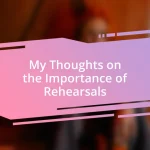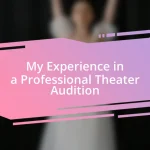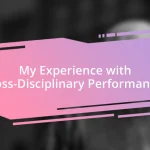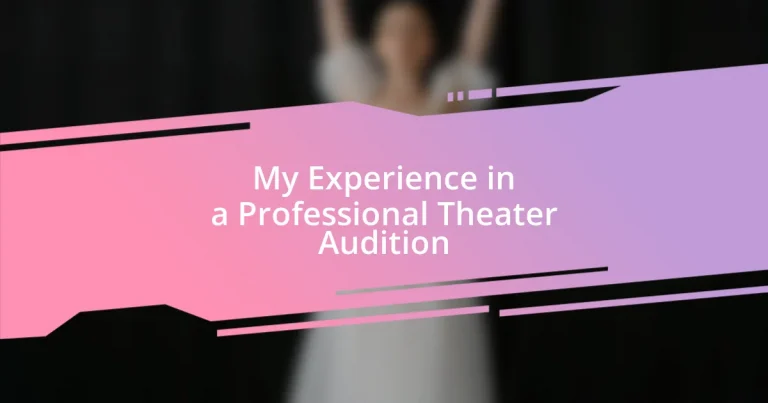Key takeaways:
- Preparation is essential for building confidence and delivering an authentic performance; choosing relatable material and practicing techniques like mirroring enhance emotional connection.
- Making a strong first impression with eye contact and engaging the audience is crucial; the choice of material should reflect personal experiences and resonate with the audition context.
- Awareness of common mistakes, like unpreparedness and failing to connect with the panel, alongside reflection on experiences can lead to growth and a more enriching audition journey.
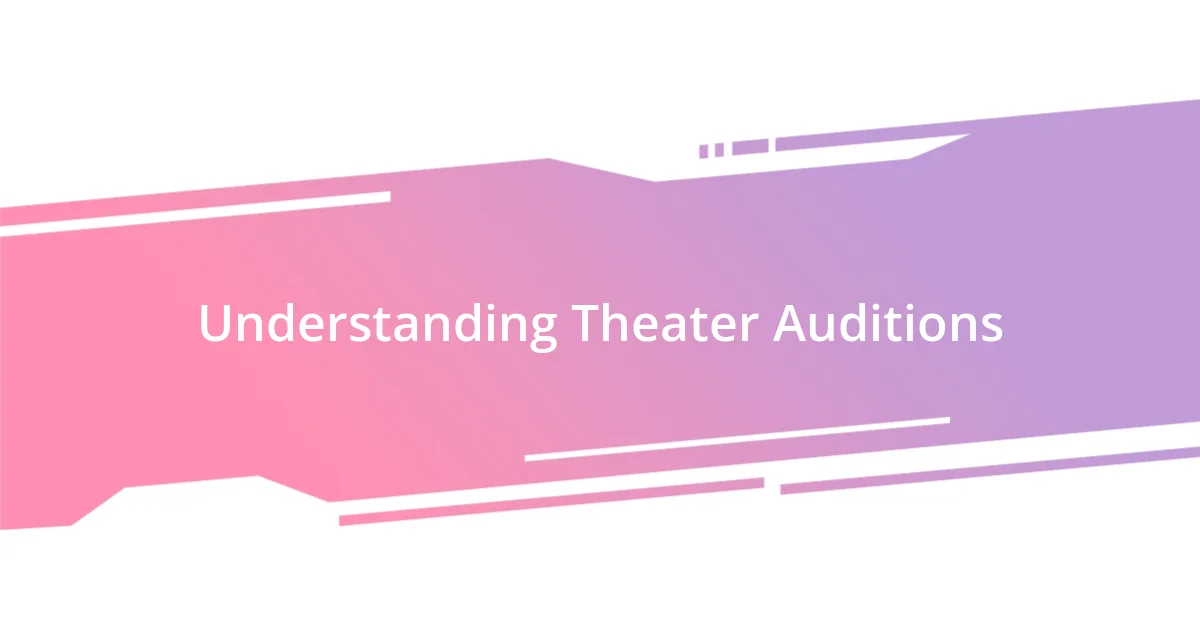
Understanding Theater Auditions
Theater auditions can feel like stepping onto a tightrope – exhilarating yet nerve-wracking. I remember my first audition vividly; my palms were clammy, and I could hear my heart racing. That moment taught me that understanding the atmosphere is crucial; it’s not just about showing up, but about immersing yourself in the energy of the room.
What really struck me during my experiences is the power of preparation. There’s a saying in the acting community: “You can’t have confidence without preparation.” I once spent weeks rehearsing my monologue, refining every inflection. When I finally delivered it, I felt a wave of pride wash over me. Preparation truly transforms raw talent into a confident performance.
I often wonder, how does one convey authenticity in just a few minutes? This is where understanding the character comes into play. I recall auditioning for a role that pushed me out of my comfort zone. Diving deep into the character’s emotions allowed me to channel something genuine, making the audition as much about discovery as it was about performance.
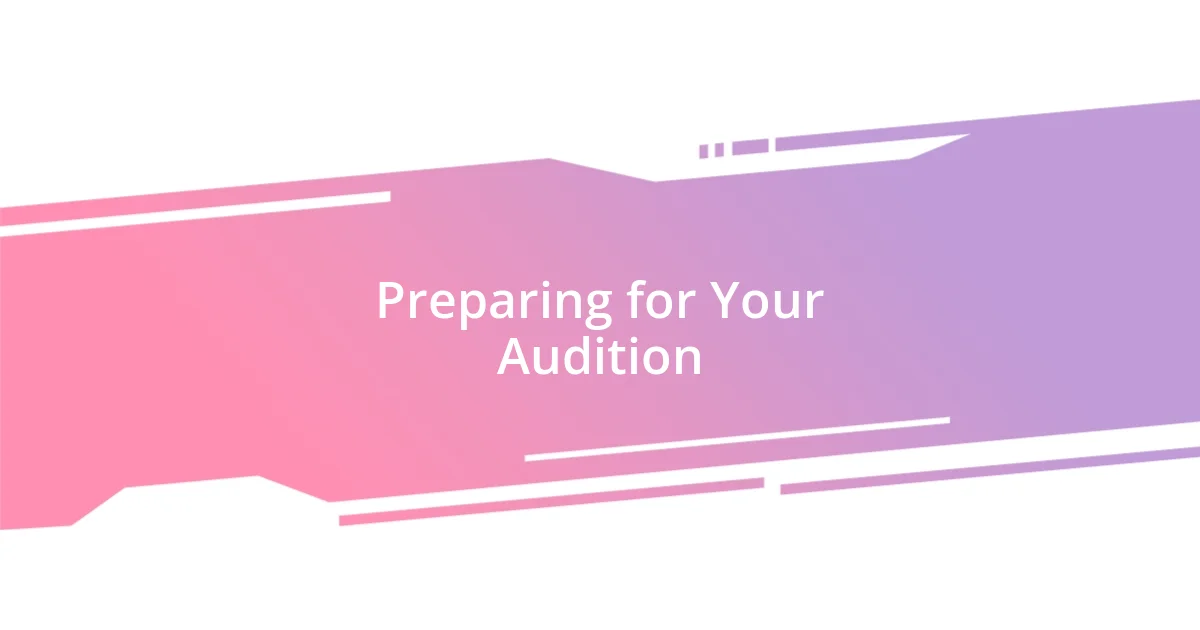
Preparing for Your Audition
Preparing for an audition requires a blend of technical skills and emotional readiness. I vividly recall a time when I practiced my lines in front of a mirror, trying to connect with my emotions while maintaining the character’s perspective. It felt a bit silly at first, but I quickly realized that this method helped me embody the role more convincingly.
Another key aspect is choosing the right material. For my last audition, I selected a monologue that resonated deeply with my own experiences. This connection not only made it easier to portray emotions authentically but also heightened my confidence. I remember feeling as though I was sharing a part of myself with the casting panel, and that genuine connection can make a significant difference.
Lastly, don’t underestimate the power of a solid warm-up routine. Before stepping into that audition room, I found doing some vocal exercises and light physical stretches helped me ease the tension. When nerves creep in, having a pre-audition ritual can ground you, allowing your true self to shine through.
| Preparation Activity | Personal Experience |
|---|---|
| Practicing in front of a mirror | It helped me connect emotionally with my character. |
| Choosing relatable material | Made me feel confident and authentic during my performance. |
| Vocal and physical warm-ups | Helped ease tension and focus my energy. |
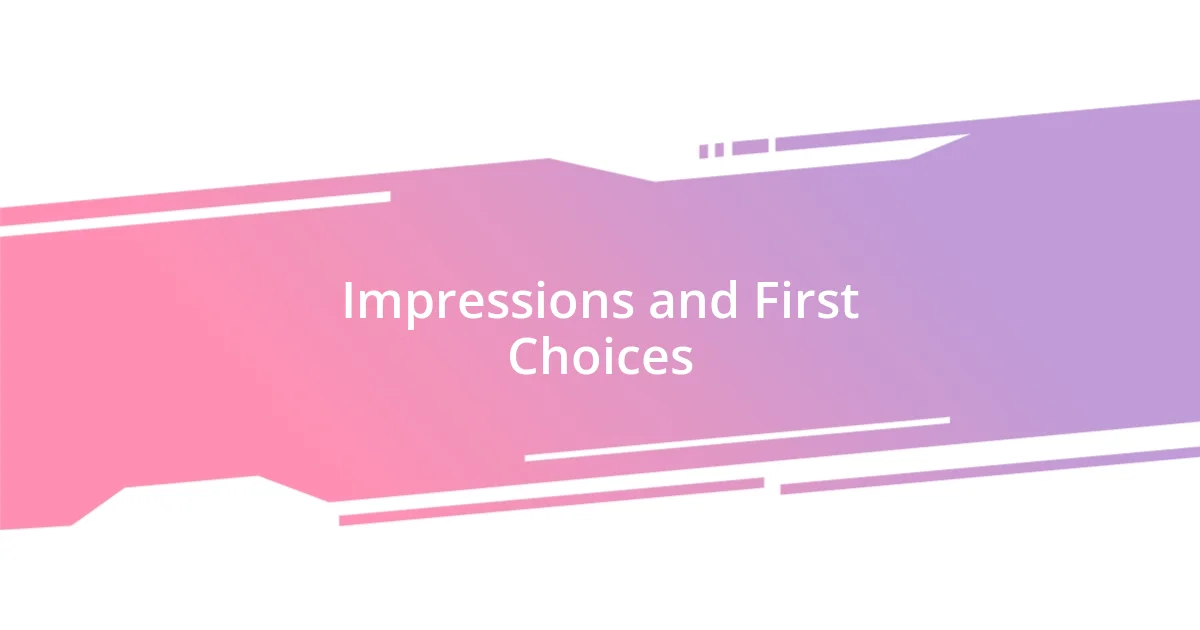
Impressions and First Choices
There’s something uniquely powerful about the impressions we leave during an audition. I recall a specific moment when I walked into the room and made eye contact with the casting director. That connection, however brief, felt electric. I knew then that my first few words would set the tone, showcasing not only my skill but also my personality.
Choosing a strong first choice of material can be a game-changer. Here’s what I’ve learned from my own experiences:
- Pick something personal: Selecting material that reflects my own experiences helps me portray emotions authentically.
- Trust your instincts: I once discarded a safe choice for a bold piece—risking it made the audition memorable.
- Connect with the audience: It’s crucial to engage with the casting panel from the outset; I focus on making them feel something right away.
By understanding these elements, I find I can make a lasting impression without second-guessing my decisions. It’s all about allowing my true self to be present in those crucial moments.
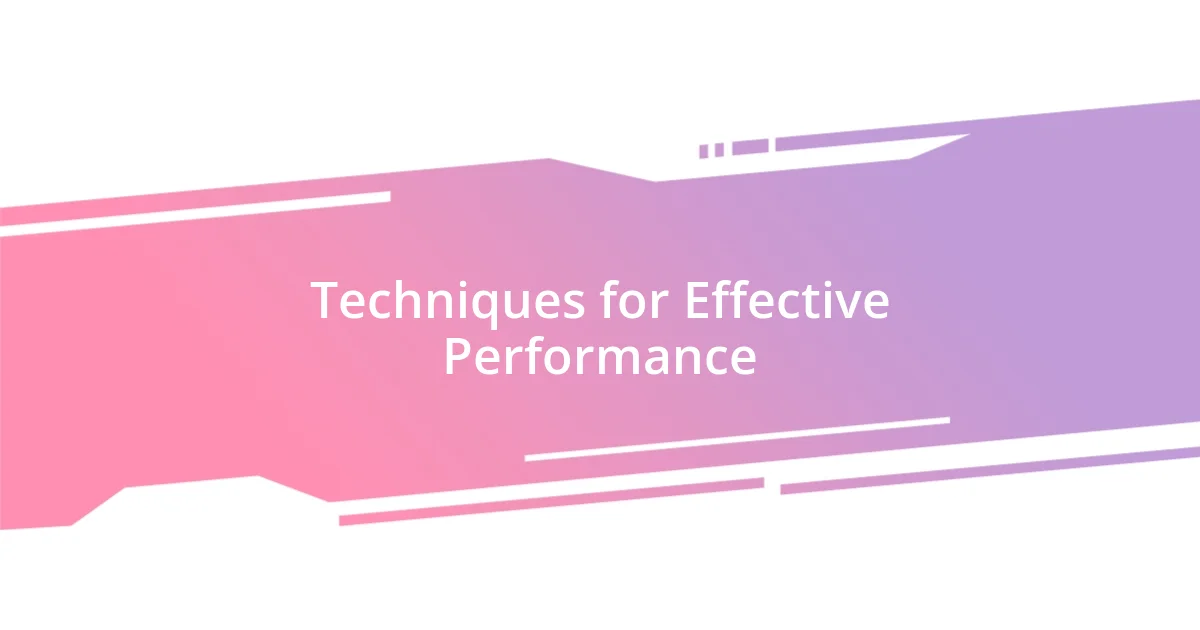
Techniques for Effective Performance
Having a clear and focused intention is vital for a powerful performance. I remember my audition for a community theater play where I approached it with a purpose – I wanted to make the audience feel something profound. This clarity guided my choices and movements throughout the piece, making everything feel more genuine. Have you ever noticed how performers who hold strong intentions seem to have a magnetic presence?
In addition to intention, physicality plays a crucial role in my performances. When I’m on stage, I tend to amplify my gestures and expressions to convey emotions more vividly. I once incorporated a specific movement into my character’s arc that mirrored the emotional journey she was undergoing. It was fascinating; the casting team seemed to respond to that depth, leading me to feel more connected to the role.
Another technique I value is the power of pauses. There was an audition where I embraced strategic moments of silence, allowing the audience to absorb the weight of my character’s emotions. Those pauses not only heightened tension but also gave me a moment to breathe and recalibrate. It’s incredible how a simple pause can transform the impact of a line – have you ever tried it? The results can be surprisingly profound, both for you and your audience.
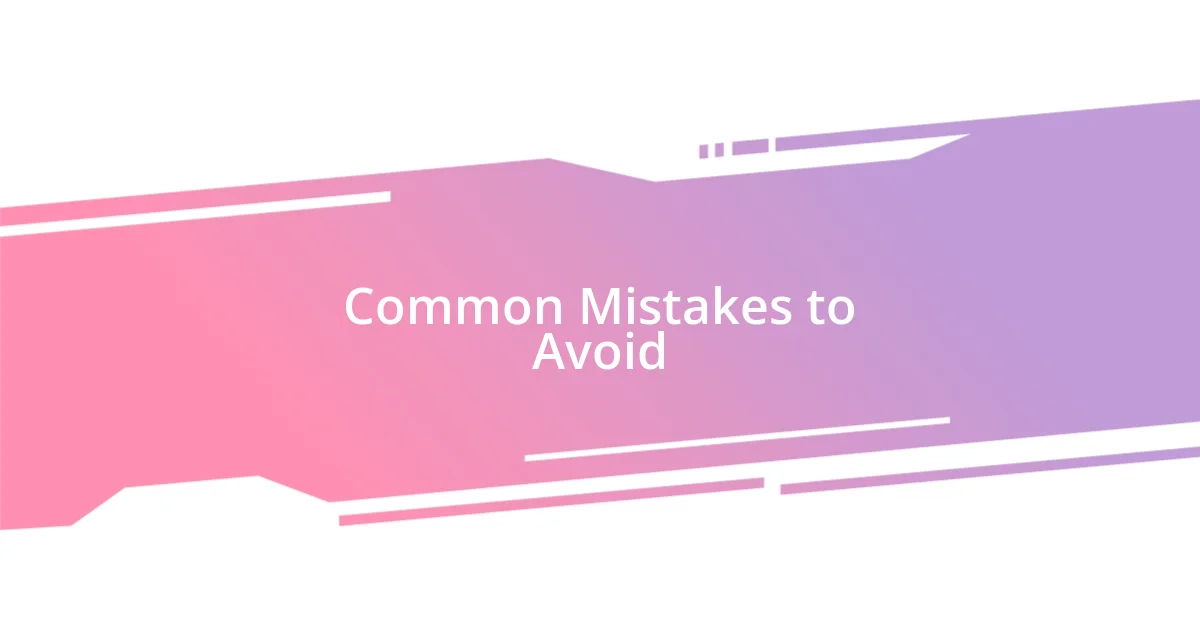
Common Mistakes to Avoid
One common mistake in auditions is arriving unprepared. I learned this the hard way during my debut tryout; I underestimated the importance of rehearsal. Glancing at my script in the waiting room felt like an acceptable last-minute revision, but when my time came, I stumbled over the lines. Have you ever been caught off guard, realizing you weren’t ready? It can completely derail your confidence and performance.
Another pitfall is not adapting your performance to the context of the audition. I once walked into a casting call for a comedic role, but my delivery was stilted and overly dramatic. The casting director looked intrigued, but I sensed their confusion; I wasn’t delivering the humor they were looking for. So, remember, understanding the tone of the piece is essential. Adaptability is key – can you imagine how much stronger your audition could be if you tailored your choices to fit the mood?
Neglecting to engage with the panel is also a common oversight. I’ve seen fellow auditionees fixate solely on their material, forgetting that they’re performing for real people. I recall a time when I made an effort to glance at each member of the panel, and it transformed the energy in the room. When I noticed them nodding along and even smiling, it fueled my energy and connection. So, I ask you, how often do you take a moment to truly connect with your audience? That simple engagement can elevate your performance significantly.
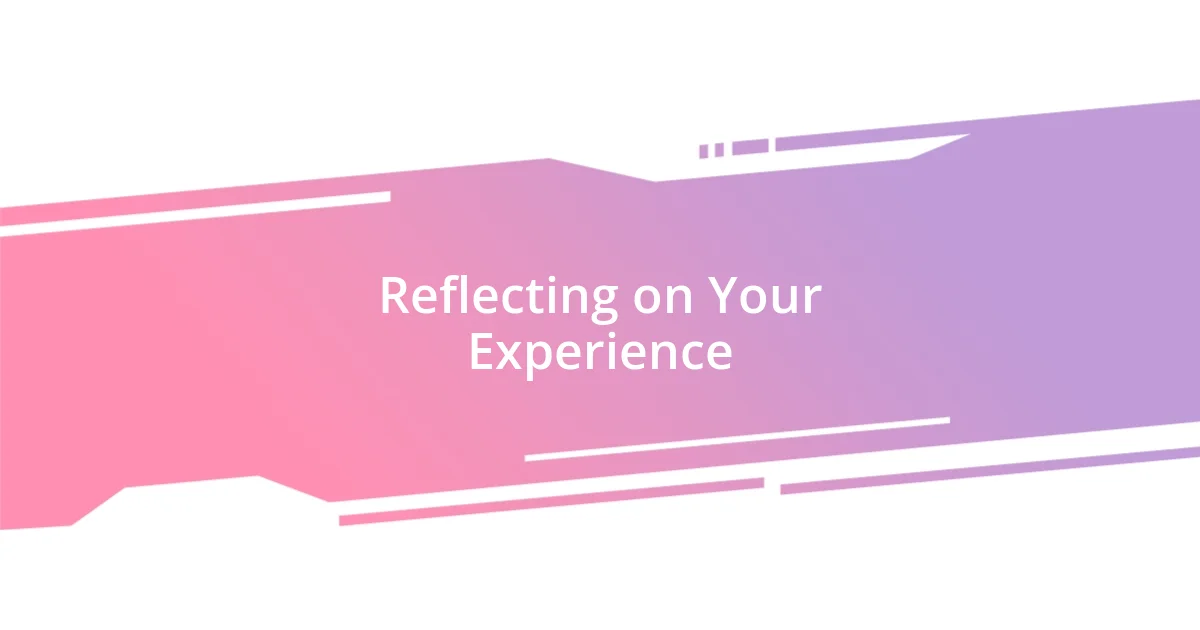
Reflecting on Your Experience
Reflecting on my audition experience, I find it crucial to analyze how I felt before stepping on stage. The nerves were palpable, surging through me like an electric current, but I learned to embrace that energy. It reminded me of my first time on stage; I had a fluttering mix of excitement and fear that ultimately fueled my performance. Have you ever felt that rush? It’s a reminder that these feelings can serve as motivation, pushing us to connect more deeply with our characters.
As I think back on how I responded to feedback from the audition panel, I recognize the importance of openness. There was a moment when the director offered a suggestion, and instead of bristling, I took a deep breath and embraced it. That acceptance not only improved my performance right then but also fostered a sense of growth. I’ve often wondered, how willing are we to accept critiques? It’s an opportunity to evolve, and I believe that every piece of advice can be a stepping stone toward becoming a more nuanced performer.
Looking back, I also remember the moments with other auditionees—it’s fascinating how that camaraderie can shape our experiences. Sharing our nerves and excitement with fellow actors created a sense of solidarity. I once had a heartfelt conversation with a peer before our auditions, which made the waiting feel more bearable. Those connections often remind me that we’re not alone in this journey. Have you noticed how much richer your experience becomes when you share it with others? It can truly transform the audition process from a solo endeavor into a collaborative adventure.
